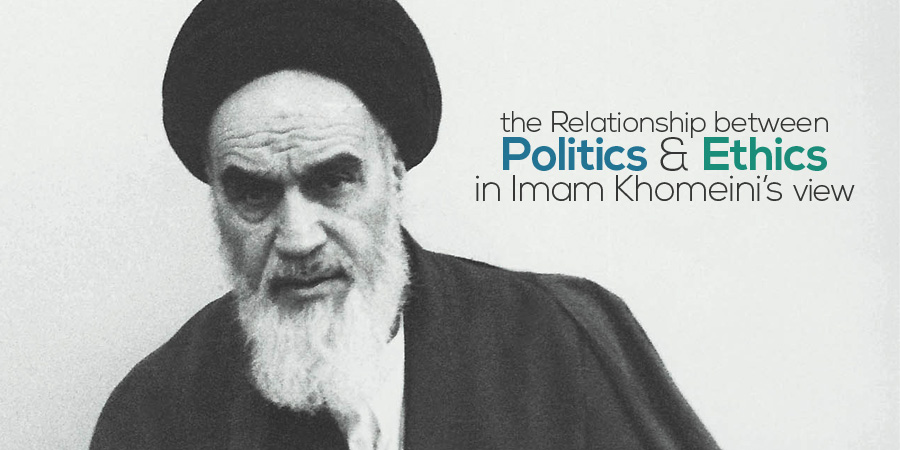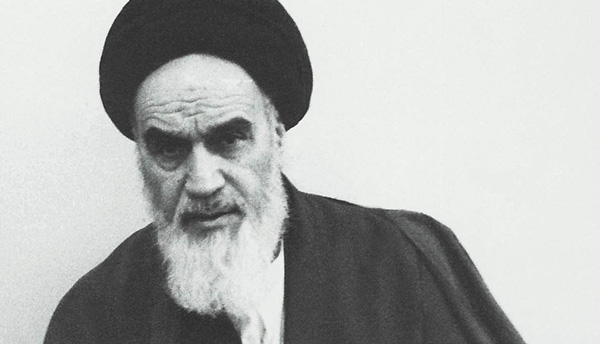What is the Relationship of Politics and Ethics in Imam Khomeini’s view? (4)

Oneness of ethics and politics in Islam
The Imām believes that if man is left to himself he will fall under the sway of his carnal desires and material needs and any type of educational and political system, even the correct one, will be incapable of nourishing his spiritual dimensions, whereas the foundation of everything is spiritual and by reforming and nourishing this dimension in man, all other problems will be solved.
In his opinion, the enigma of today’s world is a moral one and if it is not solved, the world will head downhill toward destruction. “The things that are threatening the world are not arms, bayonets, missiles, and the like… What is leading these people and these countries to perdition and decadence is the degenerations among the heads of countries and in the actions of the governments, which is emerging from the moral decadence.”[1]
According to the Imām, “The school of thought of Islam is not a materialist school; it is a material-spiritual school… Islam has come for the edification of man. The mission of Islam and the goal of all the prophets (‘a) is this—to nurture man.”[2]
Therefore, the source of every political approach should be ethics. Attention to spirituality is inevitable because “the foundation is spiritualities.”[3] Basically, without ethics, politics is incapable of guiding the people and securing their true interests and if we assume that there is a person who implements a correct policy… this policy is just one dimension of the politics which had been for the prophets (‘a), the saints [awliyā’], and now for the scholars [‘ulamā’] of Islam. Man is not one-dimensional.
The society too is not one-dimensional. Man is not a mere animal whose affairs only concern food and eating. If there were both satanic policies and correct policies, they would guide and lead the community in one dimension and that is the animal dimension and material-social dimension. Such is of politics which in Islam is fixed for the prophets (‘a) and for the saints. They want to guide the nation, the nations, the society, and the individuals, and to pave the way for all the conceivable interests of man and the society.[4]
This point is the kernel of Imām Khomeinī’s moral-political thought. As such, we are not dealing with two independent types of knowledge and realms. Politics is the extension of ethics while ethics is the underpinning of politics. By reflecting on the above-mentioned pivots, this point becomes very clear. Since its goal is the growth of man’s material and spiritual dimensions and as these dimensions are supposed to be nourished concordantly and harmoniously, Islam has enacted laws for mankind.
These laws, although concern the individual, while some others concern the society, and some have educational aspects while some others have political ones, all are in pursuit of a single goal. So, these laws ought to have various features. First of all, they should cover all the dimensions and aspects of man’s existence. The other is that they should be comprehensive in scope. Finally, they should not be defective. Instead, they should complement one another. In reality, such are the laws of Islam.
From the viewpoint of the Imām, “Islam has rules and regulations covering the entire life of man, from the day he is born up to the moment he enters his grave.”[5] Similarly, these laws are comprehensive and versatile. “Islam is everything for this man; that is, it has facts from nature to beyond nature to the celestial world; Islam has a thesis; Islam has a program.”[6] And finally, all the laws of Islam have a single framework.
The religion of Islam is not only a devotional religion… Neither is it a mere political sect and religion. It is both devotional and political. Its politics is identical with its devotion. Its devotion is indistinguishable from its politics. That is, its very devotional aspect has also a political facet.[7]
The Imām even goes to the extent of explicitly considering religious ethics and politics as one. Anchored to the notion of unity of the two, he emphatically says:
Islam’s ethical precepts are also political. That precept in the Qur’an that all believers are brothers is an ethical precept, a social precept, and a political precept as well. If the believers of the different schools of thought existing in Islam, and who are faithful to God and the Prophet of Islam (s), be as brothers to one another, just as one has love for his own brother, and that all segments have love for one another, apart from being a great Islamic morality with far-reaching moral effects, it is a great social precept with great social effects.[8]
To sum up, the core of the Imām’s view and the quintessence of his thought on ethics and politics is the unity of the two, and its being obvious and needless of argumentation. Now that ethics and politics are interwoven, and that lying, oppression, injustice, mischief, etc., both in the individual and social spheres are bad, the Islamic ruler should try to always abide by the principles of ethics and not overstep its limits. Although this task is difficult, it is possible. The only way of preserving political authority and guaranteeing the real interests of the Islamic system in the long term is to abide by the principles of ethics and keep aloof from any form of deception at all costs. Not a single Muslim statesman can overlook this principle. The last statement of the Imām on the preservation of political authority and his emphasis on ethics should always be our motto:
Through Islamic behaviour; preservation of the movement; advancement of the movement; paying heed to the fact that God, the Sublime and Exalted, approves of us; and Islamic conduct and morality, you can preserve this power which has taken you to victory.”[9]
In conclusion, not only politics could, but should be, ethical. Through these moral standards, politics should be cultivated since the basis and essence of the Islamic teachings is such. History bears witness to the prominence of this tenet. If this tenet has failed elsewhere, it cannot be concluded that it will always fail and that it is an impossible venture.
Nowadays, most of the political thinkers have arrived at the conclusion that it is only through ethical politics that the chance for survival exists. Even Machiavelli, who would stress so strongly on the independence of politics from ethics, believed that this immorality is more dependent on the type of government, not on the principle of politics. He used to say that the possibility of ethical politics is more in the republican form of government than in absolute and dictatorial governments.
Then, in order to substantiate his view he used to narrate an interesting story. While discussing the drawing up of a contract, he poses this question: “Which pact of alliance is more reliable—alliance with a republican government or with an absolute monarchy?” Then, he stresses the fact that there are various reasons for violation of contracts, one of which is the state’s expedience.
But even in this case, republican governments remain faithful to their contracts and promises for a longer period of time than the monarchies do. There are abundant instances wherein a very minute gain has induced a monarch to violate a treaty while profuse interests have failed to compel a republican government to infringe an accord.
Themistocles said before the national assembly of Athens, “I have a suggestion, which entails a great gain for Athens… The assembly appointed Aristides to hear his suggestion on the basis of his recommendation and decide. Themistocles said to Aristides, “All the warships of Greek cities which have trust in their pacts of alliance with Athens, have all collected in a certain place where they could all be easily destroyed, and by destroying them, the Athenians could gain control over the whole of Greece. After listening to this suggestion made to the assembly, Aristides said, “The suggestion of Themistocles is extraordinarily beneficial and extraordinary contrary to dignity. The assembly voted against the suggestion.[10]
Thus, immorality and informality is not a political necessity; it is, rather, a function of the form of rule and government, its goals and officials.
Written by Sayyid Hasan Islami
Translated by Mansoor L. Limba
References:
[1] Ibid., vol. 16, p. 161.
[2] Ibid., vol. 5, p. 531.
[3] Ibid., vol. 5, p. 533.
[4] Ibid., vol. 13, pp. 431-432.
[5] Ibid., vol. 1, p. 271.
[6] Ibid., vol. 4, p. 9.
[7]Ibid., vol. 4, p. 447.
[8] Ibid., vol. 13, pp. 130-131.
[9] Ibid., vol. 13, p. 142.
[10] Goftārhā [Discourses].



